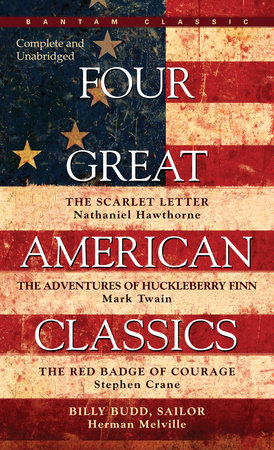Four Great American Classics

These four landmark novels of nineteenth-century American literature have gained a permanent place in our culture as great classics. They are not only part of our national heritage, but masterpieces of world literature whose deep and lasting influence is felt to this day.
The Scarlet Letter vividly records America’s moral and historical roots in Puritan New England and masterfully re-creates a society’s preoccupation with sin, guilt, and pride.
The Adventures of Huckleberry Finn carries readers along on Huck’s unforgettable journey down the Mississippi in America’s foremost comic epic—the first great novel in a truly American voice.
The Red Badge of Courage re-creates the brutal reality of war and its psychological impact on a young Civil War soldier in one of the most moving…